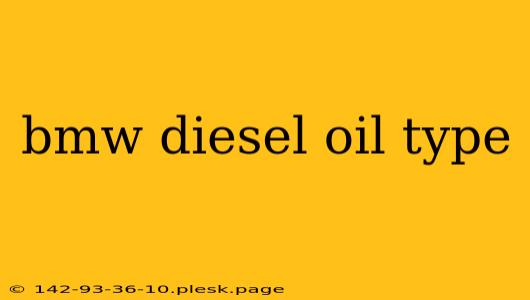Choosing the right diesel oil for your BMW is crucial for maintaining peak engine performance, longevity, and reliability. Ignoring this seemingly small detail can lead to costly repairs down the line. This comprehensive guide will clarify the complexities of BMW diesel oil types, helping you make informed decisions to keep your prized possession running smoothly.
Understanding BMW Diesel Engine Specifications
Before diving into specific oil types, it's vital to understand that BMW utilizes various diesel engines across its model range. Each engine has specific requirements, detailed in your owner's manual. These specifications often dictate the necessary oil viscosity and performance characteristics. Never disregard these recommendations; using the incorrect oil can void your warranty and damage your engine.
Key Factors Influencing Oil Selection:
- Engine Model: The specific engine (e.g., M57, N47, B57) significantly impacts the recommended oil type. BMW's engine technology has evolved over the years, resulting in variations in oil requirements.
- Viscosity Grade: This refers to the oil's thickness at different temperatures. Common viscosity grades for BMW diesel engines include 0W-30, 5W-30, and 5W-40. The number before the 'W' indicates the oil's performance in cold temperatures, while the number after the 'W' indicates its performance at higher temperatures. Your owner's manual will specify the appropriate viscosity grade.
- Performance Standards: BMW often specifies adherence to particular industry standards, such as ACEA C3 or LL-04. These standards ensure the oil meets certain performance criteria, including soot handling capabilities and protection against wear.
- Oil Type: BMW diesel engines typically require low-sulfur, low-ash, and low-phosphorus oils to protect emission control systems like the Diesel Particulate Filter (DPF). Using the wrong oil can damage these sensitive components.
Deciphering BMW Oil Specifications: A Closer Look
BMW's oil specifications can appear confusing. Understanding the terminology is key. You'll often see specifications like:
- LL-04: This is a long-life oil specification developed by BMW. Oils meeting this standard are designed for extended drain intervals.
- ACEA C3: A European standard specifying performance requirements for oils used in modern diesel engines with emission control systems.
Finding the correct oil specification is paramount. Always consult your owner's manual or the BMW website for the specific recommendations for your vehicle's year, model, and engine.
Choosing the Right BMW Diesel Oil: Practical Advice
Once you’ve identified the correct viscosity grade and performance standards, selecting the right oil becomes straightforward. Many reputable brands offer oils that meet BMW's specifications. When purchasing, ensure the oil container clearly displays the necessary specifications.
- Don't compromise on quality. Using inferior oil can have severe consequences for your engine.
- Check your oil level regularly. Maintaining the correct oil level is essential for optimal engine performance.
- Follow the recommended oil change intervals. This ensures your engine remains protected and operates efficiently.
Maintaining Your BMW Diesel Engine: Beyond the Oil
While selecting the correct oil is crucial, it’s just one aspect of proper engine maintenance. Regular servicing, including air filter replacements and fuel filter changes, contributes significantly to engine longevity. Following your owner's manual’s recommendations for scheduled maintenance will ensure your BMW diesel engine provides years of reliable service.
By understanding the nuances of BMW diesel oil types and diligently following the manufacturer's recommendations, you'll significantly extend the life and performance of your engine. This guide serves as a valuable resource, but always prioritize the specifications outlined in your owner's manual.

